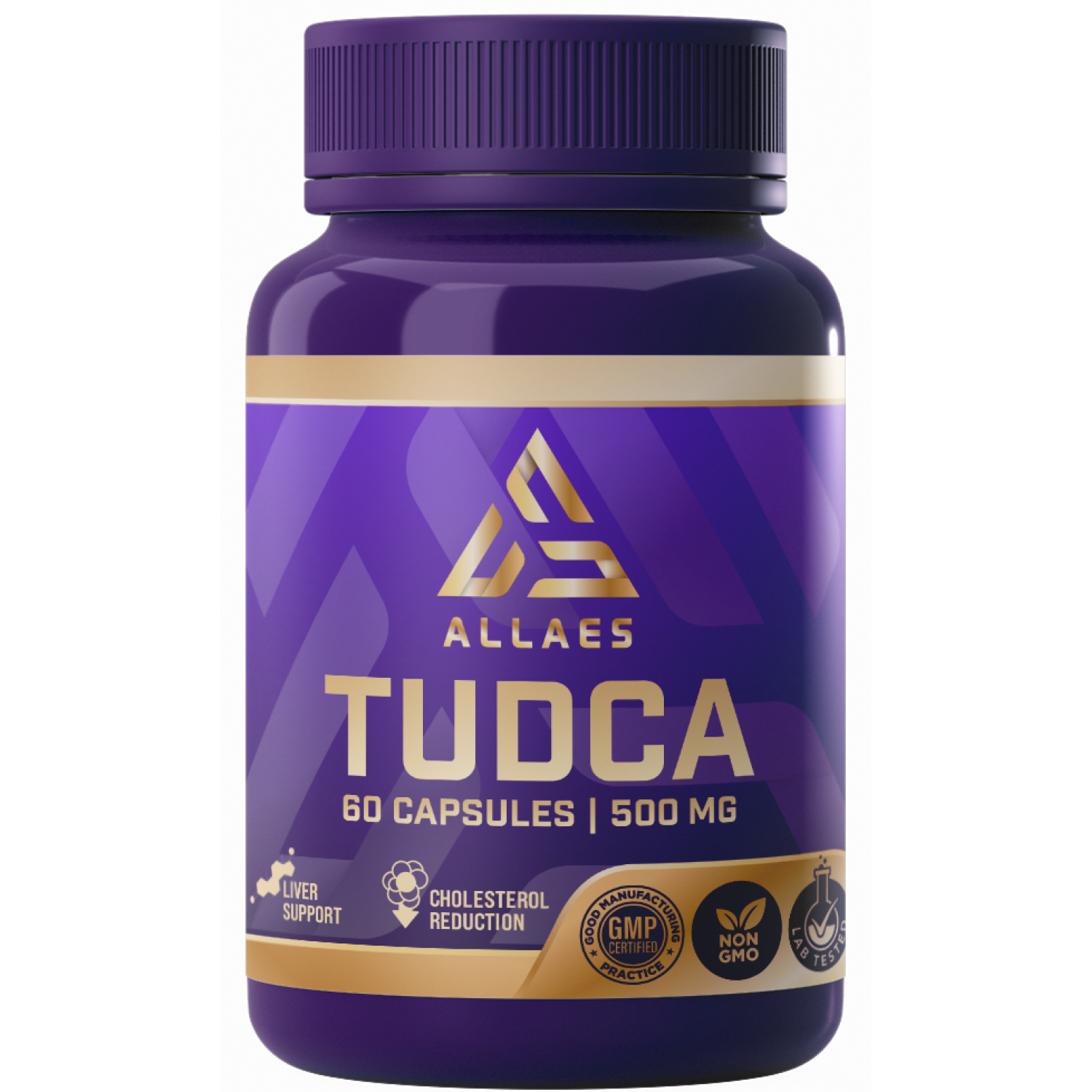





- Stock: In Stock
- Package: 500mg / 60 capsules
What is TUDCA?
Tauroursodeoxycholic acid is a highly hydrophilic tertiary bile acid that is produced in humans at a low concentration. It is a taurine conjugate of ursodeoxycholic acid with comparable therapeutic efficacy and safety, but a much higher hydrophilicity. Normally, hydrophilic bile acids regulate hydrophobic bile acids and their cytotoxic effects. Tauroursodeoxycholic acid can reduce the absorption of cholesterol in the small intestine, thereby reducing the body's intake of dietary cholesterol and the body's cholesterol content.
Tauroursodeoxycholic acid works to decrease bile acid and cholesterol levels. It reduces the cholesterol content and increases the bile acid content in gallbladder bile to prevent the formation of gallstones.
Tauroursodeoxycholic acid possesses anti-apoptotic and anti-inflammatory properties. These findings provoked the investigations of tauroursodeoxycholic acid as a potential therapeutic agent for neurodegenerative diseases, such as amyotrophic lateral sclerosis, Alzheimer's disease, and Parkinson's disease. Other studies also suggest that tauroursodeoxycholic acid can promote angiogenesis and suppress adipogenesis of adipose-derived mesenchymal stem cells (MSCs). Anti-osteoporotic effects of tauroursodeoxycholic acid have also been documented, as it was shown to enhance osteogenic differentiation of bone marrow-derived MSCs.
How it works?
About 90% of gallstones are formed by cholesterol, which may be caused by altered gut microbiota from a high-fat diet and other factors. The gut microbiota regulates bile acid metabolism; thus, altered composition in gut microbiota may significantly change the bile acid pool and alter cholesterol secretion.
While the exact mechanism of action of tauroursodeoxycholic acid in reducing and preventing gallstone formation is unclear, tauroursodeoxycholic acid may achieve this effect in a number of ways. A recent mouse study suggests that tauroursodeoxycholic acid inhibits intestinal cholesterol absorption and lowers liver cholesterol levels by upregulating the bile acid excretion from the liver to the gallbladder. Tauroursodeoxycholic acid lowers the bile cholesterol saturation in the gallbladder, thereby increasing the solubility of cholesterol in bile. It can also maintain a specific gut microbiota composition to promote the synthesis of bile acids and reduce liver inflammation caused by the lipopolysaccharide in the blood. Ultimately, tauroursodeoxycholic acid enhances the synthesis of bile acids in the liver and reduces cholesterol in the serum and liver.
Tauroursodeoxycholic acid inhibits cell apoptosis by disrupting the mitochondrial pathway of cell death. It works by inhibiting oxygen-radical production, ameliorating endoplasmic reticulum (ER) stress, and stabilizing the unfolded protein response. Other anti-apoptotic processes mediated by tauroursodeoxycholic acid include cytochrome c release, caspase activation, DNA and nuclear fragmentation, and inhibition of p53 transactivation. It is believed that tauroursodeoxycholic acid works on multiple cellular targets to inhibit apoptosis and upregulate survival pathways.
Benefits for the body and health
- Treat your liver. Steroid use, including anabolic steroids, which are often misused in bodybuilding to speed muscle growth, can have harmful effects on the liver. Long-term or heavy use of these drugs can lead to liver damage or even liver disease. TUDСA is a very effective remedy for maintaining liver health, especially during the cycle.
- TUDСA decreases cholesterol levels and prevents gallstones.
- TUDСA helps to digest protein and fat components of food. Bodybuilders often consume high-protein diets to support muscle growth. While protein is necessary for muscle growth, an excessively high protein and other food and supplements may strain the liver over time.
- Supports Insulin Sensitivity. TUDCA may enhance insulin sensitivity by improving insulin signaling pathways and reducing cellular stress, potentially beneficial for conditions like type 2 diabetes and obesity where insulin resistance is common.
- Energy Production: The liver helps regulate blood glucose levels by storing excess glucose as glycogen. During intense exercise or between meals, the liver converts this stored glycogen back into glucose to maintain energy levels. This energy is crucial for fueling muscle contractions during workouts, contributing to muscle growth.
- Supports IGF-1 insulin-like growth factor 1 (IGF-1) production.
When the pituitary gland releases growth hormone, it stimulates the liver to produce IGF-1. This hormone then promotes the growth and development of cells in various tissues throughout the body, especially muscle and bone.
IGF-1 is a critical factor in muscle development and repair. It helps stimulate protein synthesis and the proliferation of satellite cells, which are crucial for muscle repair and regeneration following damage (like the micro-tears that occur during strength training).
Maintaining a healthy liver is essential for IGF-1 production because if liver function is impaired, it may not be able to produce adequate amounts of IGF-1 in response to growth hormone stimulation, which could have implications for muscle growth and repair.
Weak or damaged liver cannot produce IGF-1 so it limits your muscle growth and worsens athletic performance.
Dosages
- To maintain healthy liver – 500mg
- To treat damaged liver(chronic elevation of liver enzymes, cholelithiasis. thickening of bile, including during the cycle) - 1000-1500 mg
It's recommended to take TUDCA before bedtime.
TUDCA side effects
In general, side effects with TUDCA are extremely rare, but may include:
- Digestive Issues: Some individuals may experience digestive discomfort, including diarrhea, stomach pain, or nausea.
- Allergic Reactions: Although rare, allergic reactions such as rash, itching, or swelling (especially of the face, tongue, or throat) can occur.
- Bile Flow Disruption: Since TUDCA is a bile acid, it may affect bile flow, which could be problematic for people with certain liver or gallbladder conditions.
How to use it?
If your goal is simply to provide liver support during periods of intense training and increased nutrition, as well as the prevention of cholelithiasis, then it is enough to take TUDCA 500 mg before bed in courses or on an ongoing basis if you are prone to thickening of bile, you have dyskinesia of biliary tract and other conditions that can worsen due to intense training, increased nutrition and the use of steroids.
If you use a large amount of steroids, use high androgen or 17 alpha alkylated oral steroids especially, or already have poor liver enzyme tests, then TUDCA dosage should start at 1000 mg and increase as needed.
FAQ
Is TUDCA similar to UDCA ?
TUDCA is a taurine-conjugated form of UDCA. This means that TUDCA has an additional taurine amino acid attached to the UDCA molecule.
The conjugation with taurine makes TUDCA more water-soluble compared to UDCA. This can affect how each is absorbed and utilized in the body.
Medical studies show identical positive effects on the liver of both UDСA and TUDСA.
Is TUDCA safe for long-term use?
There is limited research on the long-term use of TUDCA in humans. In the studies that have been conducted, TUDCA is generally well-tolerated when used at recommended doses during long-term use.
Can TUDCA be used in combination with other supplements or medications?
Yes, TUDCA is well combined with other medications and supplements, for example for the persons with mild, non-alcoholic fatty liver disease (NAFLD) combinations of TUDCA(UDCA) and metformin are very common.
Is TUDCA suitable for everyone?
There is limited research on the safety of TUDCA for pregnant or breastfeeding women. Therefore, it is typically not recommended for use in these groups.
People, who already have big gallstones, should use TUDCA with caution. It's important to consult with a healthcare provider before using TUDCA if you have any existing health issues.
Ask a Question About This Product
What is TUDCA?
Tauroursodeoxycholic acid is a highly hydrophilic tertiary bile acid that is produced in humans at a low concentration. It is a taurine conjugate of ursodeoxycholic acid with comparable therapeutic efficacy and safety, but a much higher hydrophilicity. Normally, hydrophilic bile acids regulate hydrophobic bile acids and their cytotoxic effects. Tauroursodeoxycholic acid can reduce the absorption of cholesterol in the small intestine, thereby reducing the body's intake of dietary cholesterol and the body's cholesterol content.
Tauroursodeoxycholic acid works to decrease bile acid and cholesterol levels. It reduces the cholesterol content and increases the bile acid content in gallbladder bile to prevent the formation of gallstones.
Tauroursodeoxycholic acid possesses anti-apoptotic and anti-inflammatory properties. These findings provoked the investigations of tauroursodeoxycholic acid as a potential therapeutic agent for neurodegenerative diseases, such as amyotrophic lateral sclerosis, Alzheimer's disease, and Parkinson's disease. Other studies also suggest that tauroursodeoxycholic acid can promote angiogenesis and suppress adipogenesis of adipose-derived mesenchymal stem cells (MSCs). Anti-osteoporotic effects of tauroursodeoxycholic acid have also been documented, as it was shown to enhance osteogenic differentiation of bone marrow-derived MSCs.
How it works?
About 90% of gallstones are formed by cholesterol, which may be caused by altered gut microbiota from a high-fat diet and other factors. The gut microbiota regulates bile acid metabolism; thus, altered composition in gut microbiota may significantly change the bile acid pool and alter cholesterol secretion.
While the exact mechanism of action of tauroursodeoxycholic acid in reducing and preventing gallstone formation is unclear, tauroursodeoxycholic acid may achieve this effect in a number of ways. A recent mouse study suggests that tauroursodeoxycholic acid inhibits intestinal cholesterol absorption and lowers liver cholesterol levels by upregulating the bile acid excretion from the liver to the gallbladder. Tauroursodeoxycholic acid lowers the bile cholesterol saturation in the gallbladder, thereby increasing the solubility of cholesterol in bile. It can also maintain a specific gut microbiota composition to promote the synthesis of bile acids and reduce liver inflammation caused by the lipopolysaccharide in the blood. Ultimately, tauroursodeoxycholic acid enhances the synthesis of bile acids in the liver and reduces cholesterol in the serum and liver.
Tauroursodeoxycholic acid inhibits cell apoptosis by disrupting the mitochondrial pathway of cell death. It works by inhibiting oxygen-radical production, ameliorating endoplasmic reticulum (ER) stress, and stabilizing the unfolded protein response. Other anti-apoptotic processes mediated by tauroursodeoxycholic acid include cytochrome c release, caspase activation, DNA and nuclear fragmentation, and inhibition of p53 transactivation. It is believed that tauroursodeoxycholic acid works on multiple cellular targets to inhibit apoptosis and upregulate survival pathways.
Benefits for the body and health
- Treat your liver. Steroid use, including anabolic steroids, which are often misused in bodybuilding to speed muscle growth, can have harmful effects on the liver. Long-term or heavy use of these drugs can lead to liver damage or even liver disease. TUDСA is a very effective remedy for maintaining liver health, especially during the cycle.
- TUDСA decreases cholesterol levels and prevents gallstones.
- TUDСA helps to digest protein and fat components of food. Bodybuilders often consume high-protein diets to support muscle growth. While protein is necessary for muscle growth, an excessively high protein and other food and supplements may strain the liver over time.
- Supports Insulin Sensitivity. TUDCA may enhance insulin sensitivity by improving insulin signaling pathways and reducing cellular stress, potentially beneficial for conditions like type 2 diabetes and obesity where insulin resistance is common.
- Energy Production: The liver helps regulate blood glucose levels by storing excess glucose as glycogen. During intense exercise or between meals, the liver converts this stored glycogen back into glucose to maintain energy levels. This energy is crucial for fueling muscle contractions during workouts, contributing to muscle growth.
- Supports IGF-1 insulin-like growth factor 1 (IGF-1) production.
When the pituitary gland releases growth hormone, it stimulates the liver to produce IGF-1. This hormone then promotes the growth and development of cells in various tissues throughout the body, especially muscle and bone.
IGF-1 is a critical factor in muscle development and repair. It helps stimulate protein synthesis and the proliferation of satellite cells, which are crucial for muscle repair and regeneration following damage (like the micro-tears that occur during strength training).
Maintaining a healthy liver is essential for IGF-1 production because if liver function is impaired, it may not be able to produce adequate amounts of IGF-1 in response to growth hormone stimulation, which could have implications for muscle growth and repair.
Weak or damaged liver cannot produce IGF-1 so it limits your muscle growth and worsens athletic performance.
Dosages
- To maintain healthy liver – 500mg
- To treat damaged liver(chronic elevation of liver enzymes, cholelithiasis. thickening of bile, including during the cycle) - 1000-1500 mg
It's recommended to take TUDCA before bedtime.
TUDCA side effects
In general, side effects with TUDCA are extremely rare, but may include:
- Digestive Issues: Some individuals may experience digestive discomfort, including diarrhea, stomach pain, or nausea.
- Allergic Reactions: Although rare, allergic reactions such as rash, itching, or swelling (especially of the face, tongue, or throat) can occur.
- Bile Flow Disruption: Since TUDCA is a bile acid, it may affect bile flow, which could be problematic for people with certain liver or gallbladder conditions.
How to use it?
If your goal is simply to provide liver support during periods of intense training and increased nutrition, as well as the prevention of cholelithiasis, then it is enough to take TUDCA 500 mg before bed in courses or on an ongoing basis if you are prone to thickening of bile, you have dyskinesia of biliary tract and other conditions that can worsen due to intense training, increased nutrition and the use of steroids.
If you use a large amount of steroids, use high androgen or 17 alpha alkylated oral steroids especially, or already have poor liver enzyme tests, then TUDCA dosage should start at 1000 mg and increase as needed.
FAQ
Is TUDCA similar to UDCA ?
TUDCA is a taurine-conjugated form of UDCA. This means that TUDCA has an additional taurine amino acid attached to the UDCA molecule.
The conjugation with taurine makes TUDCA more water-soluble compared to UDCA. This can affect how each is absorbed and utilized in the body.
Medical studies show identical positive effects on the liver of both UDСA and TUDСA.
Is TUDCA safe for long-term use?
There is limited research on the long-term use of TUDCA in humans. In the studies that have been conducted, TUDCA is generally well-tolerated when used at recommended doses during long-term use.
Can TUDCA be used in combination with other supplements or medications?
Yes, TUDCA is well combined with other medications and supplements, for example for the persons with mild, non-alcoholic fatty liver disease (NAFLD) combinations of TUDCA(UDCA) and metformin are very common.
Is TUDCA suitable for everyone?
There is limited research on the safety of TUDCA for pregnant or breastfeeding women. Therefore, it is typically not recommended for use in these groups.
People, who already have big gallstones, should use TUDCA with caution. It's important to consult with a healthcare provider before using TUDCA if you have any existing health issues.























